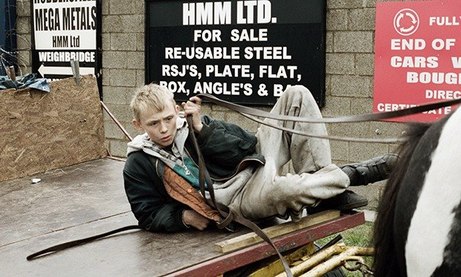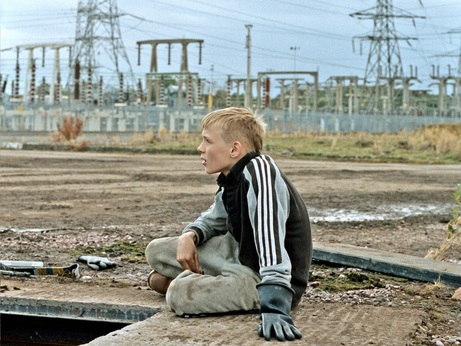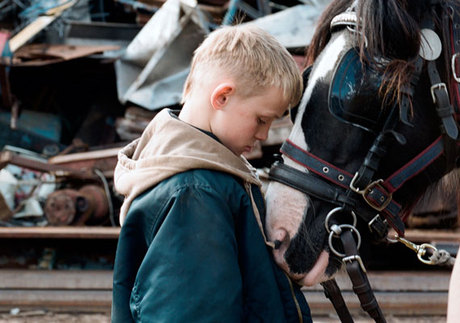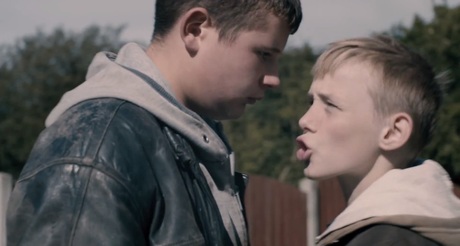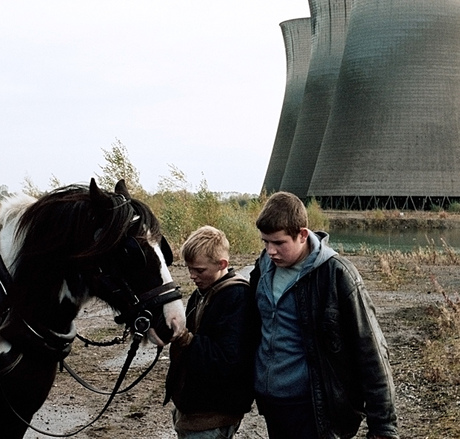|
Following on from the success of the Andrea Dunbar documentary The Arbor (2010), British filmmaker Clio Barnard has returned with her second feature The Selfish Giant. Written and directed by Barnard, the story follows two enterprising young teenagers and their exploits in the nefarious scrap metal business. Set against the grim landscape of an impoverished Bradford suburb, The Selfish Giant sets out to encapsulate the bleak realities of poverty, desperation and exploitation. The film’s protagonist, Arbor (Conner Chapman in his first film role), is a rebellious and tenacious teenager suffering from hyperactivity disorder. He is accompanied on his journey by his best friend, Swifty (Shaun Thomas, another previously uncredited actor). At the beginning of the film, Arbor and Swifty are excluded from school and quickly find new ways to fill their days; namely, stealing scrap metal and selling it to the local scrap dealer, Kitten, played by Sean Gilder (Shameless, Hornblower).
A modern adaptation of Oscar Wilde’s story of the same name, the film attempts to explore the impediments of the young, working-class male endeavour to survive. The film has received fairly widespread acclaim with screenings at Cannes and Toronto and picking up the Best Film award at Stockholm. Unfortunately, the predictable narrative, sometimes unconvincing performances and awkward dialogue mean the film slightly misses the mark. The male dominated film is characterised by antagonism, misanthropy and a deliberately downbeat plot. There is limited character development for the supporting cast; Arbor’s drug-addicted brother occasionally re-appears to remind the viewer that the protagonist’s home life is rather unconventional and Swifty’s abusive father makes an unexplained transition from a tyrannical patriarch to a sensitive, repined father. The unnecessarily glum and melancholic storyline seems determined to instil a sense of understanding with the characters and their actions, but the hackneyed plot is a regurgitation of countless other depictions of life below the poverty line. Films such as Stephen Daldry’s Billy Elliot (2000) have been more successful in encapsulating the plight and strife of an unprivileged existence; Daldry merges class politics, identity crisis and humour to create a moving and hilarious film. The derivative nature of The Selfish Giant, combined with the working-class caricatures, make it another overly depressing and purposefully austere spectacle. At one point in the film, Arbor is visited by the police for an “official warning under caution” and when they arrive, Arbor insists they remove their shoes. The police officers comply and proceed to issue the caution while Arbor plays on his phone and asks “is that it”? The police officers look sheepishly at each other and leave. Quite what is the point of the scene, is not clear. The film’s (only) attempt at humour? Or an attempt at subtlety, something which the film seriously lacks? Perhaps it is an attempt at showing Arbor’s rebellious attitude and deep mistrust of those in authority? Either way, it only serves to reinforce the film’s on-the-nose writing and lack of imagination. The film’s derelictions lie not only in the dialogue and plot, but with the characters themselves. A rule of thumb for neo-kitchen sink dramas seems to be the more swearing, shouting, violence and apathy, the better; Shane Meadows springs to mind. Kitten, the scrap dealer, seems to shout at everyone he speaks to, irrespective of proximity or emotion. The angry man syndrome is not confined to him; almost every character seems intent on raising their voice and swearing, regardless of the situation. Whilst the appeal of presenting an undiluted, realistic portrayal of male angst among northern men in a post-Thatcher Britain is understandable, the realities can be easily overlooked in the desperate attempt to achieve verisimilitude. It may come as a shock to the filmmaker, but working-class people do smile from time to time. Presenting them in such a harsh light, however honourable the intentions, is not only unrealistic, but also patronising. It is ironic that the race to the bottom approach of gritty, hard-hitting dramas like this, attempting to show poverty “like it really is”, completely misrepresent the people the characters are trying to represent. It seems that trying too hard to be realistic often results in something completely unrealistic. The film is not without merit. The young actors’ performances are commendable, Shaun Thomas in particular. His character is believable, likeable and masterfully portrayed. The actor shows depth and maturity and brings substance to the film. He manages to present his character in a sympathetic and authentic way, despite the limitations of the script and narrative. His presence on screen lends the film a degree of believability, the actor seems to understand his character and does a lot to bring him to life. Overall however, the film was disappointing. The Selfish Giant is another clichéd attempt to draw on lowest common denominator emotions, and the abysmally unconcealed emotive ending is contrived and brash, begging the audience to lament, but to no avail. |


